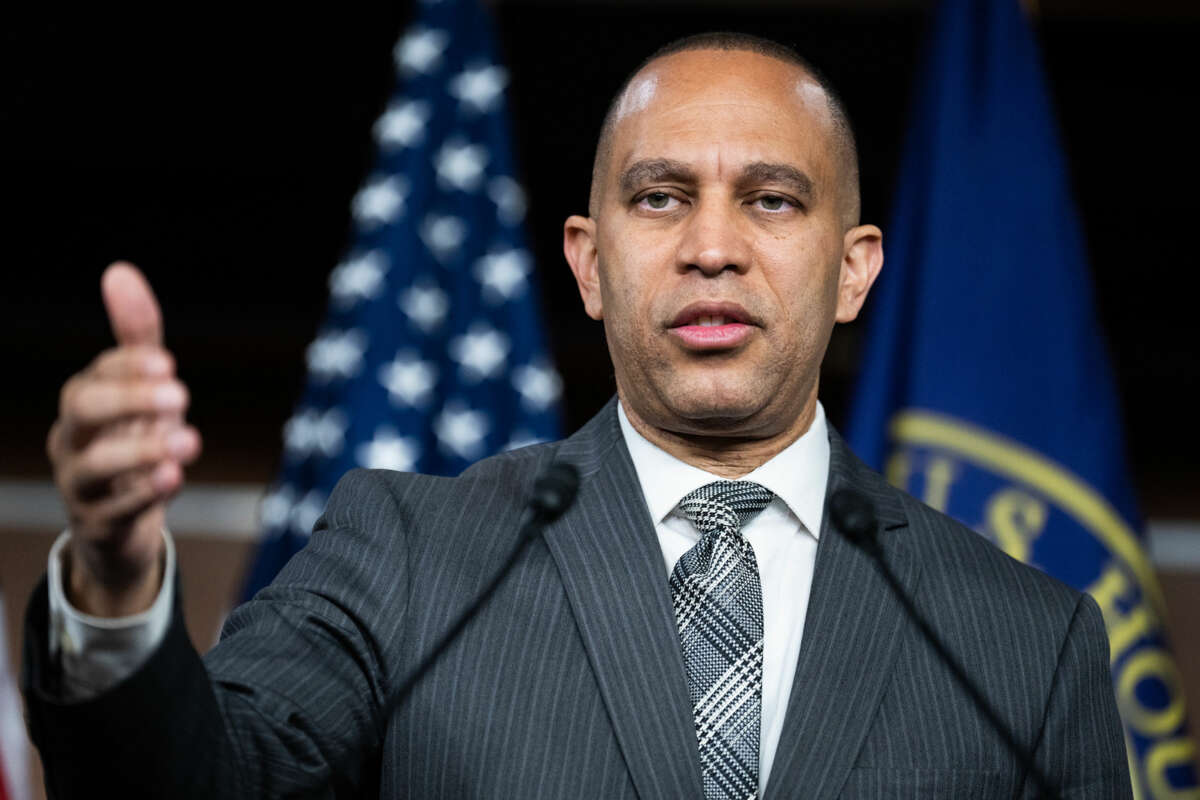House Minority Leader Hakeem Jeffries said Monday that he views discussions of a federal spending freeze — a real-term cut when adjusted for inflation — as “inherently reasonable,” a position likely to rankle progressive lawmakers who have warned against giving an inch to Republican hostage-takers.
“We’re willing to discuss freezing spending at current levels,” Jeffries (D-New York) told reporters following the latest meeting between House Speaker Kevin McCarthy (R-California) and President Joe Biden on the debt ceiling — a sit-down that came with the U.S. government just 10 days away from possibly defaulting on its obligations.
Jeffries, who has fought with progressives throughout his political career, acknowledged Monday that “many in our party” might be uncomfortable with the idea of a spending freeze, which could cut spending by more than $1 trillion over a decade.
“But President Biden recognizes we’re in a divided government situation,” said Jeffries.
Lindsay Owens, an economist and the executive director of the Groundwork Collaborative, was among the progressives who criticized the House Democratic leader’s remarks.
“Jeez. Just showing everyone our cards,” wrote Owens, who has warned that “any time you let Republicans control the terms of the debate around the debt ceiling, you’re in trouble.”
“Starting to think we need to ask the Nevada delegation to bring some poker players to the next caucus lunch for a briefing,” Owens added Monday. “This is just amateur hour.”
MSNBC’s Mehdi Hasan also expressed dismay over Jeffries’ comments:
After previously saying he would not be willing to attach any conditions to a debt ceiling increase — a stance that was backed by House Democrats across the ideological spectrum — Biden has voiced openness to reducing spending as part of a compromise with House Republicans, who have used the debt limit as leverage to pursue massive cuts to federal programs such as nutrition assistance and Medicaid.
Notably, Jeffries did not sign an April letter from House Democrats supporting a clean debt limit increase “without any extraneous policies attached.”
On Friday, White House negotiators reportedly offered to accept a deal that would freeze 2024 military and non-military discretionary spending at 2023 levels.
“That would amount to a 5% cut when adjusted for inflation — a step back from the Biden administration budget request in March, which proposed increasing discretionary spending,” Axios noted.
But Republicans dismissed the White House offer, pushing for a larger Pentagon budget and more severe cuts to non-military spending. GOP negotiators are currently pushing for around six years of federal spending caps, which would result in steep cuts to key agencies and programs and hinder the government’s ability to respond to an economic downturn.
Pointing to the White House proposal, McCarthy told the press on Monday that “a freeze is not less, it’s spending the same amount” — ignoring the impact of inflation.
The Republican speaker also made clear that the GOP — which slashed taxes for the rich and corporations in 2017, blowing a huge hole in the deficit — would not accept any tax increases as part of a debt ceiling agreement.
GOP negotiators have rejected White House offers to close tax loopholes, including the notorious carried-interest loophole exploited by rich private equity executives.
“I’ve been very clear with the president from day one. We’re not going to raise taxes,” McCarthy said Monday. “It’s a spending problem.”
Progressive lawmakers continued to push back against Republican demands for spending cuts on Monday as the White House and McCarthy both described their latest meeting in positive terms, signaling that a deal is possible before the June 1 deadline.
“Reminder: When House Republicans insist we ‘spend less,’ they mean public housing, food assistance, Medicaid, and addiction support,” the Congressional Progressive Caucus tweeted Monday. “We cannot give in to this extortion.”
When asked about talk of a spending freeze, Rep. Rosa DeLauro (D-Connecticut) responded bluntly: “Look at what’s being proposed in terms of cuts. Don’t talk about spending in the abstract.”
“Head Start — 200,000 kids no slots, 100,000 kids without childcare,” DeLauro, the top Democrat on the House Appropriations Committee, said Monday. “Talk to me about what has been suggested.”
Our most important fundraising appeal of the year
December is the most critical time of year for Truthout, because our nonprofit news is funded almost entirely by individual donations from readers like you. So before you navigate away, we ask that you take just a second to support Truthout with a tax-deductible donation.
This year is a little different. We are up against a far-reaching, wide-scale attack on press freedom coming from the Trump administration. 2025 was a year of frightening censorship, news industry corporate consolidation, and worsening financial conditions for progressive nonprofits across the board.
We can only resist Trump’s agenda by cultivating a strong base of support. The right-wing mediasphere is funded comfortably by billionaire owners and venture capitalist philanthropists. At Truthout, we have you.
We’ve set an ambitious target for our year-end campaign — a goal of $250,000 to keep up our fight against authoritarianism in 2026. Please take a meaningful action in this fight: make a one-time or monthly donation to Truthout before December 31. If you have the means, please dig deep.
